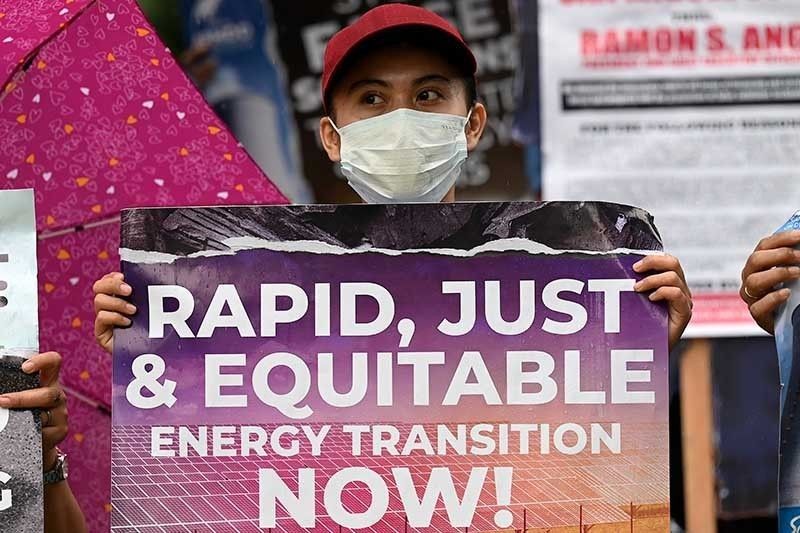Groups hit Marcos' RE pronouncements, COP27 delegation's 'silence' on energy transition

MANILA, Philippines — Energy advocates criticized the pronouncements of President Ferdinand Marcos Jr. on the country’s energy plans and the participation of the Philippine delegation to the COP27 climate summit as they stressed the need to phase out all fossil fuels to keep alive the goal of capping global warming to 1.5 degrees Celsius.
At the Asia-Pacific Cooperation CEO Summit in Thailand on Thursday, Marcos reiterated the government’s target of increasing the share of renewable energy in the power generation mix to 35% by 2030 and to 50% by 2040.
The target, however, is not enough. An analysis from think tank Climate Analytics said that for the Philippines to align with the goal of keeping global temperature rise to no more than 1.5 degrees Celsius, it must raise the share of renewables in the power mix to 80 to 83% by 2030 toward a full transition by 2040.
The country must also phase out coal and gas by 2035.
“In aiming to raise our use of renewable energy to only 35% by 2030, the government practically abandons any and all hope of keeping the 1.5°C ambition alive,” said Gerry Arances, CEED executive director.
“It is sending the message that the majority of our power would still come from coal, gas and other fossil fuels, and thus condemns Filipinos to decades more of pollution, high energy prices and permanently chaotic climate systems,” he added.
Under the landmark 2015 Paris Agreement, temperature rise should be slashed to well below 2 degrees Celsius from pre-industrial levels, and preferably the safer goal of 1.5 degrees Celsius.
The Power for People Coalition also said that a 1.5°C-aligned renewable energy transition offers Filipino consumers a way to break free from high electricity prices.
Marcos earlier said that increasing the use of renewable energy sources such as solar, wind, hydropower and geothermal is at the top of the government’s climate agenda. But he is also pushing for nuclear and fossil gas — energy sources that groups said will impede the transition to a low-carbon economy and threaten host communities.
Silence on energy transition
The Power for People Coalition also criticized the Philippine delegation at COP27 climate summit in Sharm El-Sheikh, Egypt over its “silence on the urgency of an energy transition.”
“Nearly two weeks since the climate talks started and even now as it nears its end, the delegation has kept its mouth shut on the need to move away from coal, gas, oil and all other fossil fuels globally, and has failed to demand mechanisms to facilitate the transfer of resources owed to developing countries like ours for our energy transition,” the coalition said.
In a release Thursday, the Department of Environment and Natural Resources shared the delegation said it pushed for the adoption of a precise definition of loss and damage, establishment of a mechanism that would fund and deliver technical support to help countries manage losses and damage, and delivery of finance, technology and capacity building by industrialized countries.
“Appropriate non-market approaches, focused on climate policy, such as fiscal measures, progressive phasing out of subsidies for fossil fuels, promoting renewable energies, and reducing emissions from deforestation and forest degradation, are some of the things that the Philippine delegation supported as well,” the release read.
DENR Secretary Maria Antonia Yulo-Loyzaga, head of the Philippine delegation, and Climate Change Commission Secretary Robert Borje left before the end of the negotiations to attend hearings for the 2023 national budget. This left Ezzedin Tago, Ambassador of the Philippines to Egypt, as the nominal head of the delegation.
The Power for People Coalition urged the government and its COP27 delegation to call for, and ensure that, a rapid and just phase-out of all fossil fuels becomes part of the outcomes of this year’s climate talks
The first draft of the COP27 climate deal would keep a target of capping global warming to 1.5 degrees Celsius and urged countries to phase-down unabated coal power — a repeat of the Glasgow deal’s request.
- Latest


























